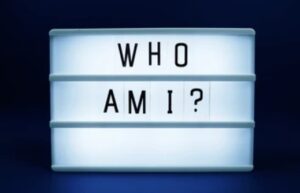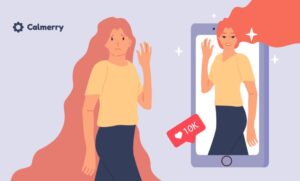Who am I? The concept of identity is challenging enough to wrap our heads around, before taking into account the digital world. Personally, I feel I have spent years trying to truly feel who I am as a person, and I wonder – has the digital world played a role in this journey, without me realizing it?

When thinking about how we approach the concept of identify in a digital world, our classmate Brittany shared the concept of digital identity, as described in the article The Illusion of Self in the Digital Age, that “our identity is becoming, or is already a fractured collective of who we are but also who we are or who we present ourselves to be on all the different platforms.”
To gain a better understanding, I decided to look into other interpretations of what digital identity means. A few other definitions I found was:
- “A person’s digital identity is an amalgamation of any and all attributes and information available online that can bind a persona to a physical person.” (Forbes.com)
- “A digital identity is a collection of information about a person that exists online. ” (Onfido.com)
From this, my understanding is that your digital identity begins with what you are sharing about yourself online and what can be found publicly.

Reflecting on my own digital identity:
Growing up in the age when social media was just forming, I feel as though I have changed my online persona or identity multiple times throughout those years. From my super awkward song lyric slightly-emo high school posts, to my unfortunate images of my college partying days, to my beginning career era where I was overly cautious about what I was posting publicly. In the past, my online presence was primarily Facebook and has slowly expanded over the years.
As Dr. Couros described in our conversation, digital identity was previously explored with the fear tactic of “what you post will affect your job prospects” and this was the experience I have had. When in our small groups discussing Brittany’s questions about whether or not we post conscientiously on social media, I shared about my past experience with posting a funny (to me) meme about math homework (I can’t even remember if now!). I was pulled into the office the next day as someone made a complaint about it. From then on, I have been more cautious of who I have on my social media and what I am posting, however I do feel I have very different online presence depending on the platform. As Khalil Liouane described, with each platform and each mask, it could be shaping us as a whole, or it could simply be showing the different masks we wear. Personally, I think it contributes to me as a whole and that I have just recognized the audience to which each platform is for.
Listening to the Social Media Ted Talk provided by Josh had me reflecting about my own fragmented sense of identity, where I would change my online identity to match what may be trending or seen as more acceptable. However, I think as I am getting older, this has definitely slowed down or stopped (I am very NOT on trend with the current slang words, fashion trends, or following ‘popular’ people… is this just a part of getting older? Or have I developed a stronger sense of who I am and not influenced as easily?). There is a sense of belonging that comes with the online identity. I am guilty of feeling as though I know someone, even though I simply follow them on instagram, yet have never met them. On the flip side to that, I am not sure that’s always a negative thing?
Is it authentic? Is it trending? Is it just to get a “rise” or followers or reach a certain limit? These are a few other thoughts I have when thinking about my own digital identity and how I am influenced by others, created more fragmented sense of identity.
Moving Forward
After reading the article and listening to the Ted Talk provided by Brittany and Josh, it has made me realize that I need to check in with myself on my own digital identity and what I am sharing online. I remember times of thinking “am I posting too often? Should I make a schedule for my posts? Does this sound like ME?” I am recognizing that the concept of identity in a digital world is much more complex with many pieces playing a role. I often find myself taking a “step back” from social media to “find myself” again, which makes me worry for our students who are truly growing up without necessarily having the opportunity to discover who they are first, without the digital world.
My final takeaway:
Just like many aspects of the digital world, I feel the concept of identity is growing and changing, as we see technology grow and change. I do fear children and teens are influenced by what is seen on media and that it is shaping their identity – not always for the best. I wonder how me, as a teacher, especially in the younger years, can help educate students on the reality of social media (not everything you see is true, can be a highlight reel etc.) and how to encourage students to continue being their authentic self.
Use of AI: I did use ChatGPT to help me create a catchy title for this blog post.

Hi Kathleen!
I connect deeply with the era of Facebook posts that involve some angsty teenage punk rock band.. Facebook likes to kindly remind me of those days every once in a while.
And, I have started to connect more deeply with this theme of identity and how it has been represented in online spaces and realize the personal growth I have witnessed over the years, yet certain parts of this development are evident in various online spaces (ex: angsty Facebook updates).
So, I think have hit the nail on the head about how important it is to be aware of our growth and identity in online spaces to encourage future students about the value of this process!
Thanks for sharing!!